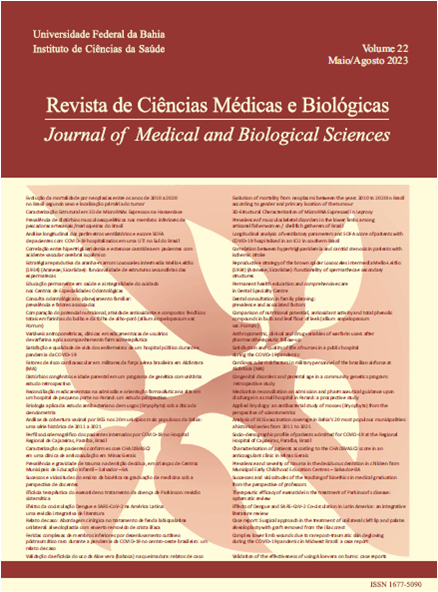CORRELATION BETWEEN HYPERTRIGLYCERIDEMIA AND CAROTID STENOSIS IN PATIENTS WITH ISCHEMIC STROKE
DOI:
https://doi.org/10.9771/cmbio.v22i2.53321Keywords:
Ischemia, Carotid Stenosis, HypertriglyceridemiaAbstract
Introduction: Cerebrovascular disease has a multifactorial etiology, depending on genetic predisposition and environmental elements related to diet and lifestyle. Like arterial hypertension and diabetes, dyslipidemia is also considered an important risk factor, and the control of hypercholesterolemia has for some time been a target for the treatment and prevention of atherosclerosis, including carotid stenosis and, consequently, ischemic stroke. On the other hand, there are few studies associating hypertriglyceridemia with the degree of carotid artery disease. Objective: To correlate hypertriglyceridemia, carotid stenosis and ischemic stroke in patients with stroke diagnosis. Material and methods: The study was cross-sectional, retrospective, with a quantitative-descriptive approach, and analyzed the medical records of 100 patients diagnosed with ischemic stroke. Sociodemographic data, risk factors, clinical signs and symptoms, as well as complementary tests were analyzed. Critical carotid stenosis was considered when equal to or greater than 70% and hypertriglyceridemia when values were greater than 150 mg/dl. Result: The mean age was 69.6 years, most were female (54%), motor deficits (79%) and language deficits (63%) predominated. The most common risk factor was systemic arterial hypertension (79%). It was observed that 38% had hypercholesterolemia and 35% had hypertriglyceridemia. Critical carotid stenosis was present in 9.21%, all of this subgroup had hypertriglyceridemia (p=0.008 and odds-ratio=3.7). Conclusion: The study concluded that there is a positive association between hypertriglyceridemia, carotid stenosis and stroke.
Downloads
Downloads
Published
How to Cite
Issue
Section
License
Copyright (c) 2023 Journal of Medical and Biological Sciences

This work is licensed under a Creative Commons Attribution 4.0 International License.
The Journal of Medical and Biological Sciences reserves all copyrights of published works, including translations, allowing, however, their subsequent reproduction as transcription, with proper citation of source, through the Creative Commons license. The periodical has free and free access.


